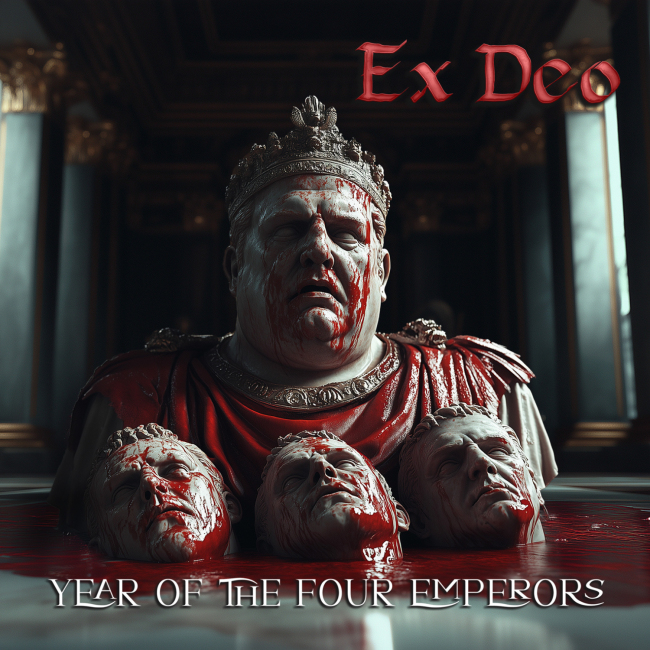
Ex Deo are surely one of the finest death metal outfits currently treading the boards. Driven by frontman Maurizio Iacono’s enduring passion for classical history, the band is far more than simply an offshoot of the mighty Kataklysm and has carved out its own special place in the death metal firmament. With less pressure to adhere to a regular release schedule than a full-time endeavour, Ex Deo’s releases are few and far between – appearing only when the various members are inspired – which accounts for the incredible quality of the band’s four albums to date. Now back with a new EP, some four years after (and providing a narrative sequel to) the stunning The Thirteen Years Of Nero, Ex Deo are ready to unleash the Year Of The Four Emperors.
Marking their label debut for Reigning Phoenix Music, The Year Of The Four Emperors looks to the dark period between CE 68 – 69, immediately after Nero’s death, which saw four emperors rise and fall in just twelve months. As with previous Ex Deo efforts, the story dictates the music, and the result is far more than just a four-track EP. While the tracks are more than able to hold their own when heard in isolation, it is a truly cinematic endeavour that is best heard as a single, sweeping, symphony of the damned.
The EP opens with the scene-setting Galba, which employs brooding strings and a brief, spoken word passage, before exploding into full-blooded death metal fury. “You will feel my wrath”, thunders Maurizio, channelling the titular emperor’s venality and cruelty over a soundtrack that evokes the turmoil of his reign. At six minutes, it is a mini epic that pairs the band’s churning death metal with deftly arranged symphonic passages, neatly encapsulating Galba’s six-month reign. While still brutal, Otho allows for more light and shade, the tribal thunder of Oli Beaudoin underpinning the story of an emperor who ultimately chose to end his own life rather than condemn his troops to further bloodshed.
The EP takes a darker, heavier turn for Vitellius. With Ex Deo adopting a grinding riff that borders on the industrial, they relate the tale of a short-lived emperor who, having faced Otho in battle, marched on Rome, turning it into a scene of debauchery, with riots, massacres, and excessively bloodthirsty games marking his controversial ascendency. As with his predecessors, he met with a violent end, murdered on the same Gemonian stairs that had been the scene of Sejanus’ death during the ill-fated reign of Tiberius – an incident given greater poignancy by a recurring piano motif that emerges from the song’s gargantuan riffs, before being subsumed under their weight once more. The EP concludes with the blistering Vespasian. The final emperor of the four, and the most long-standing, Vespasian ruled for a decade, following a tumultuous appointment which, once again, saw Rome engulfed in flames. A ruler who saw himself as the chosen one according to the omens and oracles (referenced in Maurizio’s typically articulate and well-researched lyrics), Vespasian is rewarded not only with symphonic strings, but also choral backing vocals, providing the EP with a suitably imperious conclusion.
Driven by a brilliant concept and performed with typical gusto by the band, The Year Of The Four Emperors provides The Thirteen Years Of Nero with a stunning coda. A passion project, Ex Deo remains a very special band, and The Year Of The Four Emperors slots neatly into a uniquely flawless catalogue. Play it loud – this awesome EP won’t leave your player for months. 10/10



